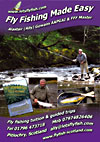|
|
Fly fishing vacations - advice
for the traveling angler
 |
| Netting a Cains salmon NB |
Whether your fishing vacation or holiday is in Scotland,
Alberta, New Brunswick,
Gaspe, Norway, Spain,
Ireland or anywhere else there are certain things
that you must not forget before setting off on a fishing trip. At home
my car arrives on the river bank stuffed with all manner of fishing tackle,
rods, reels, lines and flies of all shapes and sizes, everything is at
hand. I can look at the water, assess the conditions and choose what I
think is best. A very comfortable feeling that is suddenly missing as
I plan and pack to fish abroad, what tackle will I need? How do you prepare
for a trip away from home and without your four-wheeled tackle bag?
Let's start with the obvious you will probably need to take a rod. Sometimes
however this is unnecessary because the outfitter will provide suitable
rods, reel and lines or arranging to hire them is easier than risking
your own tackle abroad. If you do take your own equipment, be prepared
to have it lost, broken or stolen, it happens. You must have it adequately
insured. My customers coming to Scotland on guided trips can have the
use of rods, reels, lines other sundry items and hire waders for a small
fee. This saves them lots of hassle and luggage. Rods that break down
into short lengths are much handier for carrying than standard rods. I
use a 15 foot 5 piece rod and a 13 feet four piece rod for double handed
work and a 9 foot 4 piece #5 and a 9 foot 6 inch 4 piece #8 for single
handed fishing. With these I can cover all situations from delicate dry
fly for trout to heavy salmon fishing with fast sinking lines. Most airlines
are happy for these to be carried on board and although I am always concerned
should they refuse, it has not happened yet.
Reels and lines should be chosen for suitability and versatility. My usual
choice is to carry at least two identical reels and perhaps several other
lines or spare spools already loaded with line. For salmon fishing the
use of shooting heads for sunk line work greatly reduces the burden. For
flies I take whatever is appropriate, sometimes I even take some materials
in case I decide to make a few in my hand if need be. Fortunately it is
nearly always possible be beg, borrow or steal flies at the local. I like
to take a selection of tapered leaders and a few spools of monofilament
to make up custom leaders. Then come the sundries and I have never been
the type of angler who likes to drape himself with gadgets and so in my
pockets I take a pair of polarized sunglasses with amber lenses and fitted
with a "Croakies" strap which is just enough to keep them floating
- should they fall off! Glasses without a retainer are sure to be lost.
Glasses are essential for safety and comfort. A good pair of sharp scissors
or scissors pliers for cutting nylon and a small Swiss knife for odd jobs,
both attached to me by short pieces of old fly line. And finally a hook
hone to ensure that my fly remains sharp. Something to flatten barbs is
useful and if the neither the Swiss knife or the scissors pliers is man-enough,
a pair of artery forceps that double as a terrific hook remover, usually
will. Lip balm, sun block, insect repellent and/or insect proof clothing
and a small first aid kit are essentials.
Clothing requirements depend upon the venue. If you are heading north
always take waterproof and warm layers they may not be essential every
time but they can be a lifesaver. Lifejackets are often provided by the
outfitter, if not take one with you and be sure to have spare cartridges
the same goes for a wading staff. Folding staffs are easy to pack and
carry. (If you are stuck and you need one when salmon fishing a double
handed rod does the job!) Breathable waders are easier to carry and more
versatile than neoprene, provided that you take the necessary layers.
Boots with felt soles and tungsten studs are possibly the best all-round
for river wading but they are not welcome in boats! An emergency repair
kit should contain material and adhesives for patching waders or waterproofs,
a backpackers sewing kit, waterproof super glue, nylon thread and at least
a spare tip ring if not a few others and a roll of strong adhesive tape
or Duck tape.
|
 |


